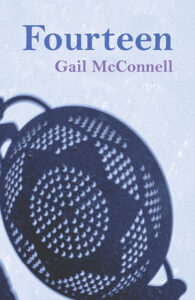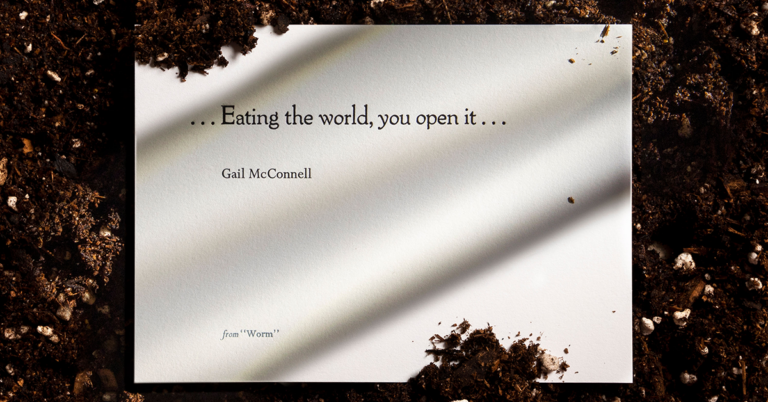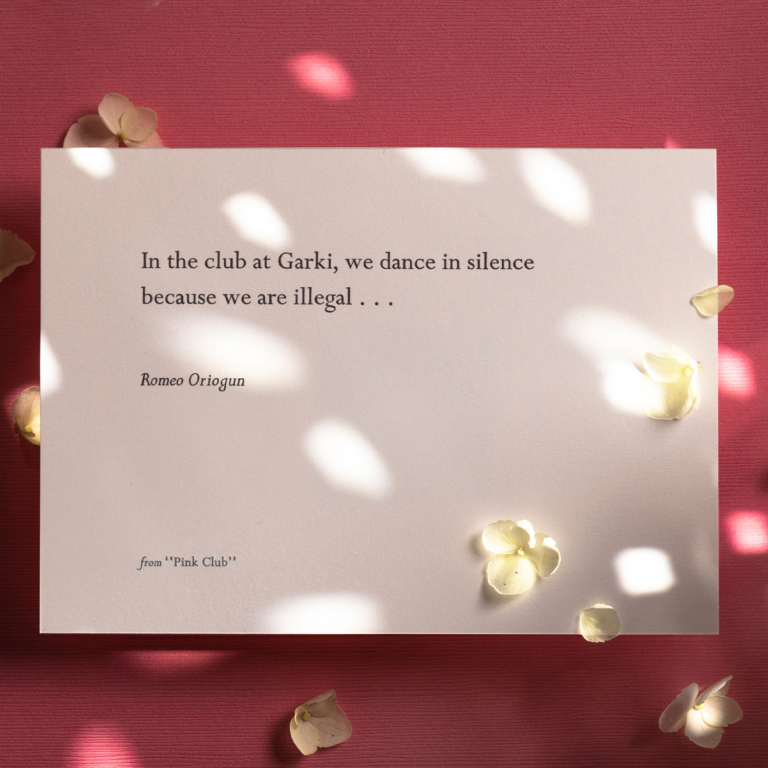Gail McConnell
Worm
In a poem that addresses a worm directly as “you,” Gail McConnell considers how these tube-shaped beings live: ingesting the earth, aerating it, digesting it, making its nourishment accessible for all kinds of growth. The worm burrows, knows dead things, and knows underground ways. Tiny and segmented though a worm is, nonetheless it senses that “all there is // can be gone through.” The poem’s close attention to the worm’s tactics of survival seems to indicate that much could be learned from its underground ways.
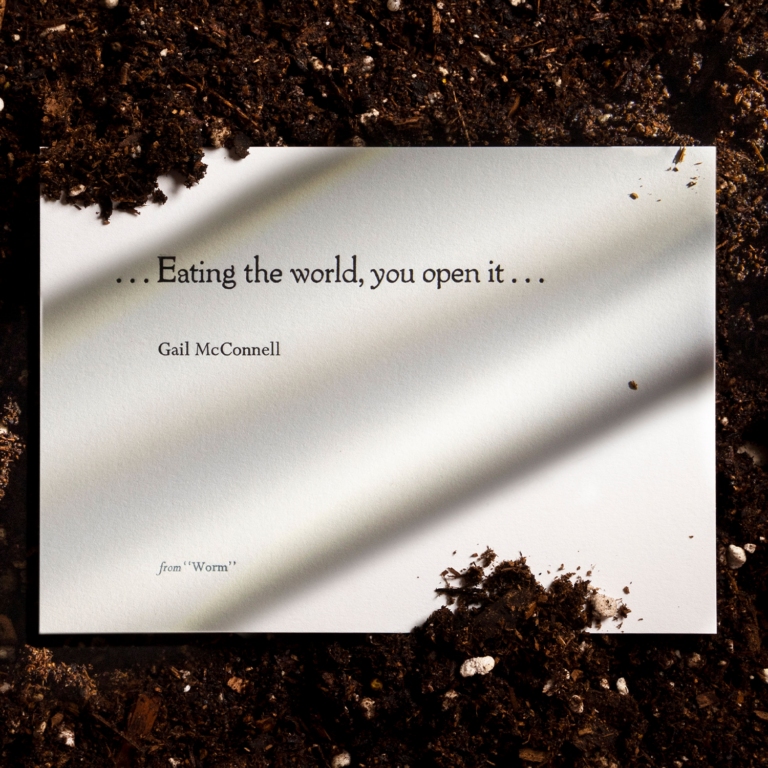
Letterpress prints by Myrna Keliher | Photography by Lucero Torres
Guest
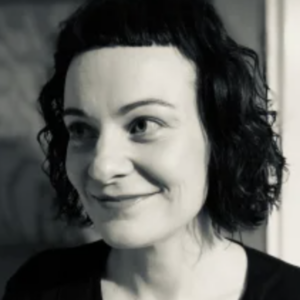
Gail McConnell publishes literary criticism and poetry and is curious about the living and the dead. Her writing interests include violence, creatureliness, queerness and the possibilities and politics of language and form. She is the author of The Sun is Open, Northern Irish Poetry and Theology, and two pamphlets of poetry: Fothermather and Fourteen.
Transcript
Pádraig Ó Tuama: My name is Pádraig Ó Tuama, and something I’ve noticed over the last few years in poetry is that I’ve become increasingly more and more interested in poems about material things, a poem that’s describing something you can touch or feel or taste or see; something that has a body of its own. I find such comfort in that. Strangely, when I’ve been in times of grief myself, or difficulty, that can be — in the midst of being a very physical sensation of feeling heavy or finding it difficult to move, you can also feel out of your body. And a poem that brings you into your body, that brings you into paying close attention to something, often helps me pay attention to myself, as well.
[music: “Praise the Rain” by Gautam Srikishan]
“Worm” by Gail McConnell:
“Burrowing in your allotted patch you
move through the dark, muscles contracting one by one
in every part, lengthening and shortening
the slick segmented tube of you, furrows in your wake.
Devising passages for water, air,
you plot the gaps that keep the structure from collapse.
Dead things you know. Plants and creatures both.
Your grooves shift matter, sifting as you go.
Eyeless, your appetite aerates.
Eating the world, you open it.
You ingest to differentiate.
Under the foot-stamped earth, you eat into a clot
of leaf mould, clay and mildew, and express what you can
part with, as self-possessed as when you started.
Your secretions bind the soil,
your shit enriches it. How things lie
now will be undone, will reoccur. You, a surface-level archivist
sensing all there is
can be gone through. The body borne
within its plot.”
[music: “The House You Wake In” by Gautam Srikishan]
This is a poem called “Worm,” and it really is a poem to a worm. Gail McConnell is one of many poets who writes what you could call “creaturely” poems, who takes a really clear and full-eyed vision of a creature in front of her, and looks at it and researches it. There’s all kinds of data about worms in this poem. Some people might take an eagle or a whale or a dog; I love this, because it takes such a close look at a worm, something that perhaps we spent a lot of time thinking about as children, finding worms gross or curious. But this is a poem that pays such intellectual and investigative and imaginative attention to a worm.
This is a poem, a short enough poem of 20 lines. But there are sentences that stretch out over lines in this poem. And the first sentence is four lines long, and then the next sentence is two lines, and then the next sentence is half a line, followed by another half a line. And on and on, throughout the poem, there’s sentences of one line or three lines or one and a half lines, or half a sentence that moves into another half a sentence. It’s almost like the poem, too, is taking the shape of a worm, stretching itself out and then contracting itself, stretching out and contracting, and burrowing its way through the dark, and being present while moving and making itself longer and shorter, just like the worm does. So the poem, too, is doing the work that it’s admiring.
[music: “Outstretched Hand” by Gautam Srikishan]
In preparing for this I wondered, what is a worm? [laughs] It’s described as a long, cylindrical tube of a body, with no limbs. It doesn’t have lungs, either; it breathes through its skin. And worms are usually eyeless. This is an earthworm that’s being described here, something that burrows. And the poem pays attention to how the earthworm’s muscles contract one by one, to move it along, lengthening and shortening, and how a worm secretes a certain kind of oil to keep it slick, so it can move. And that also helps the earth.
And the worm is made up of segments. And specifically for earthworms, there’s very particular things that are present on different segments of the earthworm. And the earthworm burrows through old leaves and the bodies of dead animals, and aerates the soil. And then its secretions and shit, it nurtures the earth, too. And so there’s such a lot of scientific attention that Gail McConnell pays to the earthworm, in this poem.
I had never thought of a worm being addressed as “you,” though. I always thought it being addressed as “it.” And Gail McConnell does something with this tiny little word, “you” — “Burrowing in your allotted patch you / move through the dark,” and then, “the slick segmented tube of you, furrows in your wake.” There’s such an intimacy in talking to a worm as “you,” rather than “it,” and that, I think, lends the attention that this poem pays something of an inter-creaturely intimacy — something where it’s a creature talking to and about a creature, rather than a person talking about a thing.
[music: “Into the Earth” by Gautam Srikishan]
Gail is very interested in all kinds of creaturely poems. She’s got poems about narwhals, which are sometimes described as the unicorns of the sea — it’s kind of like a dolphin, perhaps, with a horn; amazing — or a cuttlefish, she writes about them, too, and seahorses as well. I was always really interested in how she chose to pay attention to a particular creature and not another creature. And one time she was giving a reading, and she said that she is particularly interested in creatures that have had to learn how to survive and live in the dark and in dark and deep places, and that is one of the things that attracts her imagination. And suddenly, all of these creaturely poems of hers made sense, and especially this one about the worm.
Gail McConnell’s father was murdered in 1984, by the IRA, the Irish Republican Army, so her life has been spent, really in the wake of political assassination and grief and sadness, as well as the weightiness of being a public victim in the context of ongoing political and national and geographic warfare. The Irish Republican Army, the IRA, were using a campaign of violence and murder and terror, in order to campaign for an Ireland that they believed in. And over the course of 1968 to 1998, a period that we might call the Troubles, over the course of that period of time, three-and-a-half thousand people were murdered by different paramilitary organizations and armies. And Gail McConnell’s father was one of them.
And so when you know that about Gail’s interest in creatures that have had to survive in the dark and learn how to thrive in the deep — not just scrape by, surviving, but thrive, actually — suddenly, you can come to all these lines in this poem about the worm with a new sensibility. You know, you look at the line “you move through the dark,” and then, “you / plot the gaps that keep the structure from collapse,” and then these four words: “Dead things you know.” And then she talks about how the worm can express what it can part with — “as self-possessed as when you” — it — “started.” She says “How things lie / now will be undone,” and then, “You, a surface-level archivist / sensing all there is / can be gone through.” There’s something about looking at this worm and realizing that it thrives and actually helps the deep and the dark by its own way of living, its own capacity to do. It doesn’t have eyes, it doesn’t have lungs — it doesn’t need them. But what it does have, it uses to extraordinary purpose.
And this, I think, is one of the reasons why there’s such respect for the worm, in this poem, because there’s a curiosity about, what does it mean for any person who has had to learn how to plow the depths of their own grief, their own life, their own shock? What does it mean to look at them with respect, and the ways of survival, the ways of thriving that might’ve been unexpected, but that they have learnt and that are life-giving to those around them?
[music: “Taoudella” by Blue Dot Sessions]
I think this poem is about many things. You know, first of all, it’s about a worm, an actual worm. And second of all, it’s about what it means to find a way to thrive and find your own way in the dark, in unseen places. And in a third hand, it’s also about both of those things. It’s about both the worm and what it means to burrow your way through.
But if you were to think about this as a poem speaking about finding your way in dark places, there can be an idea sometimes, when you’re in grief, to say, “OK, I got through it. I’ve gone through the first, the second, and the third stages of grief, and that’s done now.” And this poem is wise, because it says, “How things lie / now will be undone, will reoccur.” There’s a wisdom in this, to say your work might be to keep on going through this patch of earth. This will be your work, to aerate it now, and again today, and again tomorrow, and again next week, and again and again, and that that is not meaningless. That’s actually part of the dignity of thriving. That’s part of the dignity of living.
And that is a wise aspect within the context of this poem, to look at a worm that has a particular allotted patch and to say, it might not have been chosen, that I would find my way burrowing through the circumstances of my life, but that even if that’s what you’re doing, that’s OK, because how things lie now will be undone and will reoccur. That’s the way for so many of us.
[music: “The House You Wake In” by Gautam Srikishan]
“Worm” by Gail McConnell:
“Burrowing in your allotted patch you
move through the dark, muscles contracting one by one
in every part, lengthening and shortening
the slick segmented tube of you, furrows in your wake.
Devising passages for water, air,
you plot the gaps that keep the structure from collapse.
Dead things you know. Plants and creatures both.
Your grooves shift matter, sifting as you go.
Eyeless, your appetite aerates.
Eating the world, you open it.
You ingest to differentiate.
Under the foot-stamped earth, you eat into a clot
of leaf mould, clay and mildew, and express what you can
part with, as self-possessed as when you started.
Your secretions bind the soil,
your shit enriches it. How things lie
now will be undone, will reoccur. You, a surface-level archivist
sensing all there is
can be gone through. The body borne
within its plot.”
[music: “Praise the Rain” by Gautam Srikishan]
Chris Heagle: Thank you to Gail McConnell, who gave us permission to use her poem, “Worm,” from her book Fourteen. Read the poem on our website, at onbeing.org.
[music: “Praise the Rain” by Gautam Srikishan]
Poetry Unbound is: Gautam Srikishan, Erin Colasacco, Eddie Gonzalez, Lilian Vo, and me, Chris Heagle.
Our music is composed and provided by Gautam Srikishan and Blue Dot Sessions.
This podcast is produced by On Being Studios, which is located on Dakota land. We also produce other podcasts you might enjoy, like On Being with Krista Tippett, Becoming Wise, and This Movie Changed Me. Find those wherever you like to listen, or visit us at onbeing.org to find out more.
Books & Music
Recommended Reading
The On Being Project is an affiliate partner of Bookshop.org and Amazon.com. Any earnings we receive through these affiliate partnerships go into directly supporting The On Being Project.





